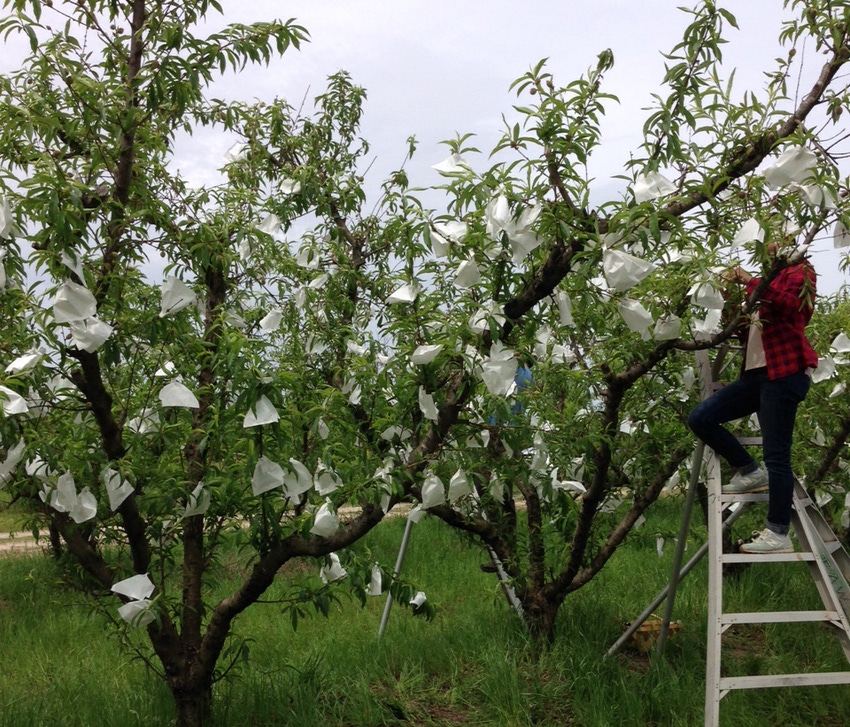
Clemson has organic peach growing 'in the bag'
Extension specialists Juan Carolos Melgar and Guido Schnabel are tying bags on peaches as they grow on trees, an unconventional method of protecting them from insects and disease while reducing reliance on pesticides.
August 4, 2015

Clemson University researchers are opening the door for organic, chemical-free peach production in the Southeast.
Extension specialists Juan Carolos Melgar and Guido Schnabel are tying bags on peaches as they grow on trees, an unconventional method of protecting them from insects and disease while reducing reliance on pesticides.
“For conventional growers, I could imagine people bagging some fruit and selling them as priority peaches or low-residue peaches for a premium,” Schnabel said. “I could also imagine that this could be a key component for organic producers, who currently don’t really have the tools to produce quality fruits. It is very tough to keep the insects and the disease off the peaches. Those bags might be the answer.”
The bags also present an answer to fungicide resistance, a costly problem in which diseases adapt to pesticides, rendering them ineffective. Additionally, bagging peaches may limit skin disorders caused by pesticide residue, acid rain or heat stress. This would reduce post-harvest waste and increase growers’ numbers of marketable peaches.
The growing method is untested in the Southeast — until now — but is done occasionally in Europe and Asia.
Melgar and Schnabel began bagging peaches this spring when the fruits were very small at the time trees are thinned of fruits to optimize nutrient and sugar distribution. Peaches were bagged at Clemson’s Musser Fruit Research Farm in Seneca and at two farms in The Ridge, South Carolina’s predominant peach-growing region in the western counties of Edgefield, Saluda and Lexington.
“We did not know if when we opened the bag if we would have rotten fruit,” Melgar said. “Now we know it works.”
Tests show sugar and acidic content, and the ratio between the two, to be the same in both bagged peaches and peaches applied with pesticides, so flavor is not affected. Fruit size and weight were also the same, Melgar said. The only difference is the color. Bagged peaches are not as blush red as conventionally grown peaches because they do not receive as much sunlight.
South Carolina growers harvest more than $64 million in peaches a year, according to figures from the National Agricultural Statistics Service. That puts South Carolina second only to California in peach production.
All of those peaches are grown with pesticide applications because organic pest management has been ineffective on peaches in South Carolina. Peaches bagged by Melgar and Schnabel are not certified organic. While the fruits were shielded from chemicals, the trees had been sprayed. Tests do suggest, however, the bagging method could work on organic trees too.
While bagging peaches may not displace pesticide applications in large-scale operations, Melgar envisions a niche market to serve healthy-minded consumers willing to pay a premium for chemical-free produce. Melgar is conducting market research to find out if that opportunity exists.
Surveyed at Upstate farmers markets, consumers overwhelmingly preferred the blush-red peaches to the more yellow peaches grown in bags. But when told the yellow peaches were free of chemicals, most changed their minds and were willing to pay a premium of up to $1 per pound, or 80 percent more than peaches grown with pesticides.
Growing peaches in bags increases labor cost — though growers would save money on pesticides while combatting fungicide resistance — so Melgar and Schnabel are working to determine if consumers would pay enough of a premium on chemical-free peaches to make fruit bagging viable for growers.
“We don’t know yet if this can be done on a large scale in the Southeast, but we will find out,” Schnabel said
You May Also Like



